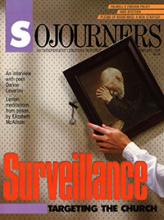Government surveillance is back. It never really left us, of course. When the intelligence "excesses" surrounding the civil rights movement, Vietnam War protests, and Watergate hit-lists came to light, public outcry called for reform within the intelligence community. Some important restrictions were imposed. Unfortunately, that simply produced an even more covert style of domestic government surveillance and created a thriving private intelligence industry supported substantially by federal dollars.
Under the Reagan administration, however, domestic government surveillance has returned to its former pre-eminence. Within months after taking the oath of office, President Reagan signed Executive Order Number 12333 on Intelligence. The order liberalized previous constraints on intelligence gathering and gave the Federal Bureau of Investigation, the Central Intelligence Agency, and the Defense Intelligence Agency a much freer hand in domestic surveillance.
Since then other government agencies having nothing to do with domestic intelligence—such as the Internal Revenue Service and the Immigration and Naturalization Service—have joined the hunt and are willing participants in surveillance, intimidation, and harassment.
Some intelligence gathering has its place. Seeking to uncover and stop a conspiracy to assassinate a public figure is a good example, assuming the evidence substantiates a legitimate threat. But that kind of purpose is not the primary concern of the political intelligence community.
The real goal of most domestic surveillance is political control. The suppression of domestic political dissent and the containment of social change movements lie more at the heart of our government's intentions. And that has never been more true than at this point in our nation's history.
Read the Full Article

